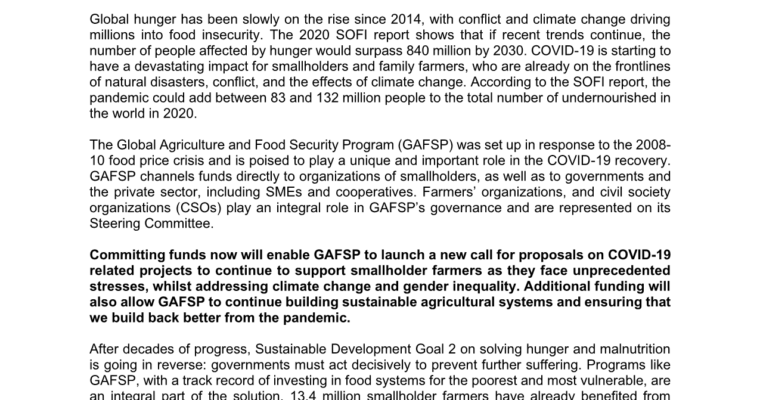Dear Donor Ministers,
We, the undersigned, are raising the alarm on the impact of COVID-19 on food security in low-income countries, especially on small-scale family farmers and producers, rural women, and youth.
The COVID-19 health crisis risks becoming a global food and nutrition crisis if governments do not act now.
Global hunger has been slowly on the rise since 2014, with conflict and climate change driving millions into food insecurity. The 2020 SOFI report shows that if recent trends continue, the number of people affected by hunger would surpass 840 million by 2030. COVID-19 is starting to have a devastating impact for smallholders and family farmers, who are already on the frontlines of natural disasters, conflict, and the effects of climate change. According to the SOFI report, the pandemic could add between 83 and 132 million people to the total number of undernourished in the world in 2020.
The Global Agriculture and Food Security Program (GAFSP) was set up in response to the 2008- 10 food price crisis and is poised to play a unique and important role in the COVID-19 recovery. GAFSP channels funds directly to organizations of smallholders, as well as to governments and the private sector, including SMEs and cooperatives. Farmers’ organizations, and civil society organizations (CSOs) play an integral role in GAFSP’s governance and are represented on its Steering Committee.
Committing funds now will enable GAFSP to launch a new call for proposals on COVID-19 related projects to continue to support smallholder farmers as they face unprecedented stresses, whilst addressing climate change and gender inequality. Additional funding will also allow GAFSP to continue building sustainable agricultural systems and ensuring that we build back better from the pandemic.
After decades of progress, Sustainable Development Goal 2 on solving hunger and malnutrition is going in reverse: governments must act decisively to prevent further suffering. Programs like GAFSP, with a track record of investing in food systems for the poorest and most vulnerable, are an integral part of the solution. 13.4 million smallholder farmers have already benefited from GAFSP projects. For instance, in Benin, one of GAFSP’s projects installed irrigation schemes in the Ouémé valley, lifting more than a million family farmers out of food insecurity. In Nepal, GAFSP (with local CSOs as service providers) succeeded in benefiting more than 600,000 women by diversifying diets and improving feeding and care practices for mothers and young children.
However, there is much more left to do.
Germany and Spain have already announced new commitments to GAFSP, and other donors have signaled financial support. We welcome this leadership and call on other donors to follow suit and fund GAFSP at the German-led digital replenishment event later this year.
Signed,




Comments are closed